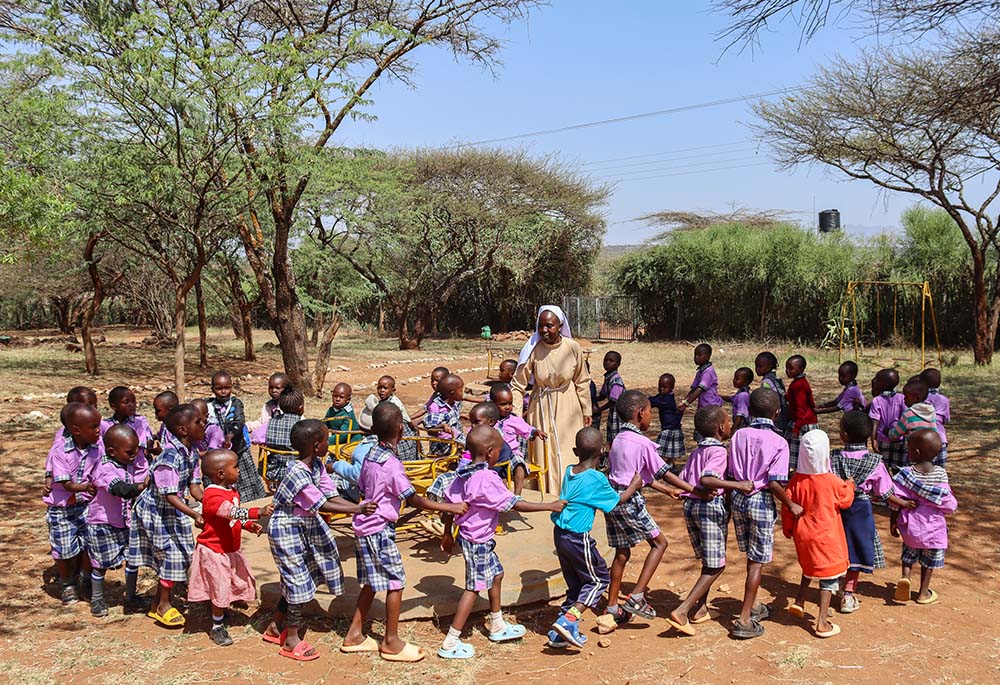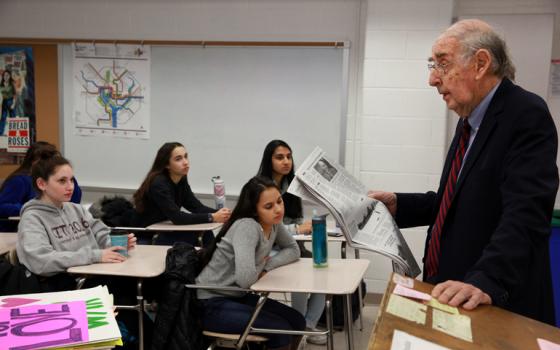
Sr. Felister Maria Kwamboka, who belongs to the Franciscan Sisters of St. Joseph Asumbi, plays with children at the nursery school that is part of the Baragoi Catholic Mission in Samburu County, northern Kenya. The school provides a safe space for children from all the tribes in Baragoi to learn and play. (Lourine Oluoch)
The journey to Baragoi, some 550 km from Nairobi in Samburu County, northern Kenya, is challenging. From the county headquarters in Maralal, travelers must board one of only two buses that brave the route or they must climb into one of the few land cruisers (owned by nongovernmental organizations or by the government) going that way. Buses are full of passengers and loaded with goods transported to Baragoi and countless markets along the way.
The journey is torturous. The corrugated road runs high above plunging valleys, giving a scenic but precarious view of what could happen should the bus topple. The journey takes an entire day, and weary travelers arrive relieved not to have been carjacked.
At 10 a.m., the happy voices of children playing at the Catholic nursery school fill the air. When classes end at 3 p.m., they rush home to their tribe's safe side of town, separated by a road from Maralal to South Horr, marking the boundary between the Turkana and Samburu communities.
As evening sets, adults hurry home, shops close early and the town goes quiet. A security drone takes over the night sky, flying low and breaking the silence. It makes several rounds through the town and its surroundings, checking for suspicious activity before moving on.
The mention of Baragoi, a small pastoralist town in Samburu County, often elicits images of insecurity and violence. Most memorable is the Baragoi massacre of November 2012, which led to the killing of more than 42 security personnel responding to banditry in the area.
Illegal firearms in the hands of civilians are common as pastoralists try to protect their livestock, and bandits often take advantage of the poor infrastructure to attack travelers along the Maralal-Baragoi road.
Advertisement
Amid the insecurity is the Baragoi Catholic Mission, established in 1952, the oldest mission in northern Kenya. It consists of St. Francis Xavier Church, a parish house, a convent, a dispensary, a nursery school and a comprehensive primary school. The mission is a safe space where all the tribes meet without qualms.
"Here, no one cares whether they are from the Turkana or Samburu community," said Sr. Felister Maria Kwamboka, administrator of the nursery school. "We remind them every day that all children belong to Jesus, and he sent angels to protect us."
"We have depended on this nursery school for a long time, said Mary Lenangetai, who has worked at the school for seven years as an early child development teacher. "It has continued to serve the whole community, even children from other churches."
Three Franciscan Sisters of St. Joseph Asumbi work at the mission. Kwamboka runs the nursery school, Sr. Immaculate Agneta Achieng teaches at the comprehensive primary school, and Sr. Mary Francis Anyango runs the dispensary, including mobile clinics for remote villages.
"When they come to the health facility, we avoid anything tribal. I have a lady who understands both languages and translates for those who cannot speak Kiswahili [the national language of Kenya]," Anyango said.

Sr. Mary Francis Anyango and other staff at the Baragoi Catholic Mission's medical dispensary in Baragoi, Samburu County, northern Kenya (Lourine Oluoch)
The mission offers a tertiary care facility with a laboratory, a minor theater, an inpatient ward with 16 beds, and dental and eye clinic services. The facility treats malaria, pneumonia, respiratory tract infections, sexually transmitted infections, tuberculosis and sometimes wounds from violence.
Baragoi is an arid and semiarid land, receiving low amounts of annual rainfall and often characterized by harsh climate and long periods of drought and hunger.
"What struck me when I came to Baragoi was the starvation and malnutrition," Anyango said. "Sometimes, you do not know whether you are treating the disease or hunger. One of the aims of expanding the facility was to deal with malnutrition."
Natasha Edapal, a resident of Baragoi, said the mission has created a good rapport with the community, helping with school fees and providing meals during the holidays.
"Unlike the government hospital, you are attended to quickly [here] and get all the medicines in the same place," she said.
Achieng said that hardship and a lack of access to water affect learners.
"You cannot speak about their dirty clothes because they do not have water at home. The children come to school hungry, and you can see they are tired and sleepy. They will tell you that they didn't eat the previous day. Sometimes, the parents don't have the money to buy books, and what the government provides isn't enough," she said.

Sr. Immaculate Agneta Achieng teaches a class at the Baragoi Catholic Mission's comprehensive primary school in Samburu County, Kenya. (Lourine Oluoch)
Despite many challenges, she is fulfilling her passion for teaching and helping young ones.
"This is a gift," she said. "Even if the place is very hard, I teach them and show them the way to the Lord. I put the challenges aside, focus and say God will help us. As you work in Samburu, you are never safe."
Adding to the challenges, the mission does not have a functional car and must use the bus or rely on others for transportation.
Last August, the sisters traveled to Maralal with the district commissioner. Forty-five minutes into the drive, they saw a stalled lorry and thought it had a mechanical problem, only to realize it had been hijacked. The attackers threatened them with guns, ransacked the vehicle and took everything they could get away with.
"We are often humiliated," Kwamboka said. "People don't have respect for the sisters. It's easier to say: God, wherever you send me, I will go. This is what it means to obey, and obedience can cause you to die, just like Jesus on the cross. [When I came here] I surrendered and told God I was ready. Since then, I found peace," she said.
John Wahome, a peacebuilding officer with a nongovernmental organization working in the area, said the mission is a symbol of unity where people feel safe.
"Even during tension, the church, school and hospital are unifying factors because they serve people across the divide."







